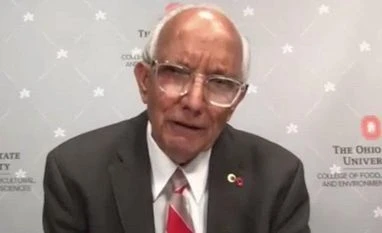Renowned Indian-American soil scientist Dr Rattan Lal has been awarded the 2020 World Food Prize for developing and mainstreaming a soil-centric approach to increase food production that conserves natural resources and mitigates climate change.
US Secretary of State, Michael Pompeo, has praised Lal, saying he is helping nearly 500 million small farmers through improved management, less soil degradation, and recycling of nutrients.
Lal was announced as the 2020 World Food Prize Laureate on Thursday. He received the $250,000 award for promoting soils for sustainable development.
The 2020 Laureate Announcement Ceremony featured pre-recorded remarks from Pompeo and US Secretary of Agriculture Sonny Perdue with World Food Prize Foundation President Barbara Stinson announcing the name of the Laureate, the World Food Priz foundation said in a statement.
"The world's population continues to grow, and we need to use the resources we have more productively and efficiently to make sure everyone has enough food on their table," said Secretary Pompeo.
"Dr. Lal's research in soil science shows that the solution to this problem is right under our feet. He's helping the earth's estimated 500 million small farmers be faithful stewards of their land through improved management, less soil degradation, and the recycling of nutrients. The billions of people who depend on these farms stand to benefit greatly from his work," he said.
From his humble beginnings as a refugee growing up on a small subsistence farm in India, Lal's determination to learn and succeed in school propelled him to become one of the world's foremost soil scientists, read the statement.
Dr Lal expressed excitement on receiving the 2020 World Food Prize but said that the urgent task of feeding humanity is not fulfilled until each and every person has access to an adequate amount of nutritious food grown on healthy soil and in a clean environment.
"The unbound joy and excitement of receiving the 2020 World Food Prize reminds me about the gratitude, privilege, and honor of working for farmers from around the world," said Dr. Lal, who now serves as Distinguished University Professor of Soil Science and founding Director of the Carbon Management and Sequestration Center at The Ohio State University (OSU).
"Yet, the urgent task of feeding humanity is not fulfilled until each and every person has access to an adequate amount of nutritious food grown on healthy soil and in a clean environment," he added
Lal began his research career at the International Institute of Tropical Agriculture in Nigeria, developing soil health restoration projects across Asia, Africa, and Latin America.
He explored and transformed techniques such as no-tillage, cover cropping, mulching, and agroforestry that protected the soil from the elements, conserved water, and returned nutrients, carbon, and organic matter to the soil. This in turn improved the long-term sustainability of agroecosystems and minimized the risks to farmers of droughts, floods, and other effects of a changing climate.
In 1987, he returned to his alma mater, OSU, where his research showed how atmospheric carbon can be sequestered in soils. This breakthrough research transformed the way the world saw soils.
As a result, soils are now not only the foundation for increasing the quality and quantity of food and preserving natural ecosystems but an important part of mitigating climate change, as well.
Three separate United Nations Climate Change Conferences adopted his strategy of restoring soil health as a means to sequestering carbon.
In 2007, he was among those recognised with a Nobel Peace Prize Certificate for his contributions to the Intergovernmental Panel on Climate Change (IPCC) reports, when the IPCC was named co-recipient of the Nobel Prize.
To read the full story, Subscribe Now at just Rs 249 a month
Already a subscriber? Log in
Subscribe To BS Premium
₹249
Renews automatically
₹1699₹1999
Opt for auto renewal and save Rs. 300 Renews automatically
₹1999
What you get on BS Premium?
-
Unlock 30+ premium stories daily hand-picked by our editors, across devices on browser and app.
-
Pick your 5 favourite companies, get a daily email with all news updates on them.
Full access to our intuitive epaper - clip, save, share articles from any device; newspaper archives from 2006.
Preferential invites to Business Standard events.
Curated newsletters on markets, personal finance, policy & politics, start-ups, technology, and more.
Need More Information - write to us at assist@bsmail.in
)